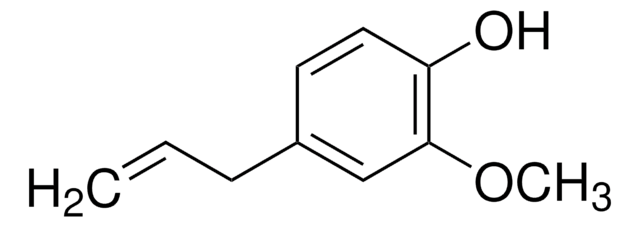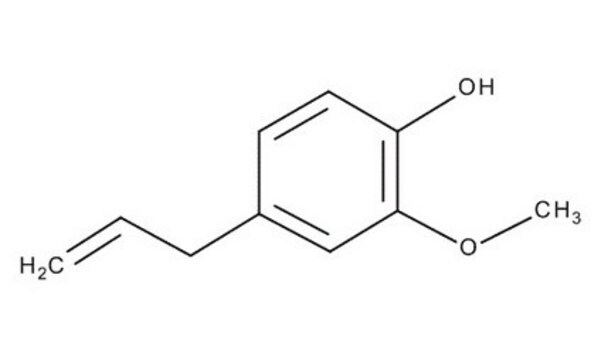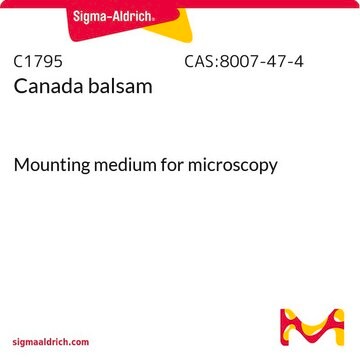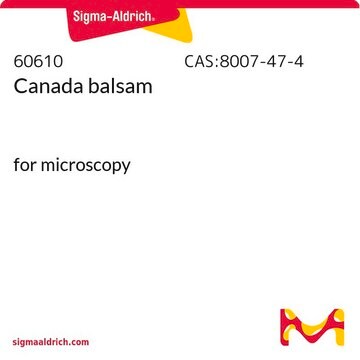C8392
Clove oil
Synonym(s):
Eugenia spp., Oil of cloves
Sign Into View Organizational & Contract Pricing
All Photos(2)
About This Item
Recommended Products
form
oil
Quality Level
refractive index
n20/D 1.532 (lit.)
bp
251 °C (lit.)
density
1.04 g/mL at 25 °C (lit.)
lipid type
oils
Looking for similar products? Visit Product Comparison Guide
Application
- Clove Essential Oil: Chemical Profile, Biological Activities, Encapsulation Strategies, and Food Applications: This review examines the chemical characteristics of clove essential oil, its biological effects, encapsulation methods, and its application in food industry, emphasizing its potential as a natural preservative and flavor enhancer (Liñán-Atero et al., 2024).
- Chitosan-Oxidized Pullulan Hydrogels Loaded with Essential Clove Oil: Synthesis, Characterization, Antioxidant and Antimicrobial Properties: This study describes the creation of chitosan-based hydrogels incorporating clove oil, detailing their synthesis, characterization, and their effective antioxidant and antimicrobial properties, useful in biomedical applications and food preservation (Suflet et al., 2024).
- Sustained release, antimicrobial, and antioxidant properties of modified porous starch-based biodegradable polylactic acid/polybutylene adipate-co-terephthalate/thermoplastic starch active packaging film: Research on biodegradable packaging films enhanced with clove oil, highlighting its sustained release capabilities and benefits in enhancing antimicrobial and antioxidant properties to extend the shelf life of packaged foods (Gui et al., 2024).
- Corn cob nanocellulose packaging for increasing the shelf life of food products: This article explores the use of corn cob nanocellulose as a packaging material, where clove oil could be utilized as a natural preservative to enhance the product′s shelf life and safety (Cheran et al., 2024).
Biochem/physiol Actions
Essential oil used for its medicinal properties. Immunomodulator and anti-inflammatory.
Storage Class Code
10 - Combustible liquids
WGK
WGK 3
Flash Point(F)
239.0 °F - closed cup
Flash Point(C)
115 °C - closed cup
Personal Protective Equipment
dust mask type N95 (US), Eyeshields, Gloves
Certificates of Analysis (COA)
Search for Certificates of Analysis (COA) by entering the products Lot/Batch Number. Lot and Batch Numbers can be found on a product’s label following the words ‘Lot’ or ‘Batch’.
Already Own This Product?
Find documentation for the products that you have recently purchased in the Document Library.
Customers Also Viewed
Mhairi Sutherland et al.
Veterinary sciences, 6(4) (2019-12-19)
The objective of this study was to evaluate if administration of clove oil prevents scur/horn growth in dairy cattle long term. At approximately 4 days of age, calves had one of four treatments assigned to each horn bud: (1) clove
Vahid Zadmajid et al.
Animal reproduction science, 187, 79-90 (2017-11-09)
Knowledge of gamete quality is a prerequisite for developing techniques to fertilize eggs and rear offspring for hatchery production. Our objective was to develop assisted reproductive techniques, via hormonal induction of final oocyte maturation (FOM), for Longspine scraper, Capoeta trutta.
Daniel B Dranow et al.
Developmental biology, 376(1), 43-50 (2013-01-26)
Sex in zebrafish is not determined by a major chromosomal locus, but instead relies on a mechanism that is influenced by a germ cell-derived signal, as animals that lack germ cells, or specifically oocytes, develop as phenotypic males. These data
Mohammad Abdus Salam et al.
PloS one, 16(11), e0260192-e0260192 (2021-11-19)
In this study, we determined the effects of dietary chitosan on the growth, biochemical composition, gut microbiota, and hematological and histological parameters of juvenile Barbonymus gonionotus. Three test diets containing three different concentrations (1, 2, and 3 g kg-1 feed)
Melissa N Hempstead et al.
Journal of dairy science, 101(6), 5374-5387 (2018-03-27)
We evaluated alternatives to cautery disbudding of goat kids using physiological measures of immediate and longer-term pain. Fifty Saanen doe kids were randomly assigned to 1 of 5 treatments (n = 10/treatment): (1) cautery disbudding (CAUT), (2) caustic paste disbudding
Our team of scientists has experience in all areas of research including Life Science, Material Science, Chemical Synthesis, Chromatography, Analytical and many others.
Contact Technical Service







